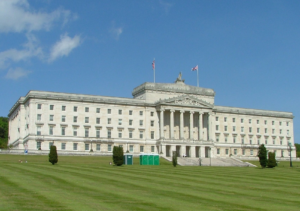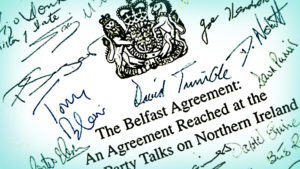 In elections to the Northern Ireland Assembly in May 2022, Sinn Féin won the largest share of the vote of any party by a wide margin. In terms of seats it was just ahead of the second placed Democratic Unionist Party (DUP). This was the first time a nationalist party has achieved such a victory. It entitles the party to nominate the First Minister in the Northern Ireland Executive. The change is largely symbolic, since under the province’s power-sharing arrangements the First Minister and Deputy First Minister are co-equals in a joint office. Previously Sinn Féin held the position of Deputy First Minister. But currently the DUP is vetoing the formation of the Executive. The psychological blow of coming second to a party viewed by Unionists with a great deal of hostility because of its association with the Provisional IRA’s campaign of violence prior to 1994 explains in part the DUP’s attitude. However, the party has mainly sought to justify its stance on the basis of dissatisfaction with the Northern Ireland Protocol. It has refused to accept that its concerns over both the principle and practice of the Protocol can be addressed in tandem with the operation of the Executive. How long the DUP will be able to maintain this position and thus prevent the formation of a power-sharing government in Northern Ireland is unclear, as is whether any face-saving formula can be found to overcome this difficulty. As its objections to the Protocol appear to be supported by the Conservative government, a quick resolution is not expected. The crisis is compounded by a lack of trust between current British ministers and the EU Commission.
In elections to the Northern Ireland Assembly in May 2022, Sinn Féin won the largest share of the vote of any party by a wide margin. In terms of seats it was just ahead of the second placed Democratic Unionist Party (DUP). This was the first time a nationalist party has achieved such a victory. It entitles the party to nominate the First Minister in the Northern Ireland Executive. The change is largely symbolic, since under the province’s power-sharing arrangements the First Minister and Deputy First Minister are co-equals in a joint office. Previously Sinn Féin held the position of Deputy First Minister. But currently the DUP is vetoing the formation of the Executive. The psychological blow of coming second to a party viewed by Unionists with a great deal of hostility because of its association with the Provisional IRA’s campaign of violence prior to 1994 explains in part the DUP’s attitude. However, the party has mainly sought to justify its stance on the basis of dissatisfaction with the Northern Ireland Protocol. It has refused to accept that its concerns over both the principle and practice of the Protocol can be addressed in tandem with the operation of the Executive. How long the DUP will be able to maintain this position and thus prevent the formation of a power-sharing government in Northern Ireland is unclear, as is whether any face-saving formula can be found to overcome this difficulty. As its objections to the Protocol appear to be supported by the Conservative government, a quick resolution is not expected. The crisis is compounded by a lack of trust between current British ministers and the EU Commission.
It is over 24 years since the Good Friday Agreement sealed an end to the violent conflict in Northern Ireland. The world and Northern Ireland have changed a great deal since then. A number of propositions were taken for granted back in 1998. They were, firstly, that close co-operation between London and Dublin would continue to underpin the settlement. Secondly, that the UK and the Republic of Ireland would remain partners in the EU. Thirdly, that the UK would continue to adhere to the European Convention on Human Rights. Fourthly, that the UK would continue to exist within its current boundaries, except in the unlikely event that a border poll in Northern Ireland led to the transfer of the sovereignty of the province to the Republic of Ireland. The first two of these no longer hold. The second two also seem insecure. And that matters a lot. Each was foundational to Northern Ireland’s political settlement and to the preservation of peace, so there appear to be valid grounds for wondering whether a settlement that in its day was hailed as a model for other deeply divided societies and as a demonstration of the value of Arend Lijphart’s big idea, consociationalism, can survive.
An objection to this line of argument might be that my list of propositions that were taken for granted is incomplete. Back in 1998 it was also commonly assumed that the two relatively moderate/centrist parties would retain their position of dominance within each community i.e. that the Ulster Unionist Party (UUP) would remain the main party of Unionism and the Social Democratic and Labour Party (SDLP) the main party of nationalism. This did not hold. The UUP and SDLP were overtaken in the Assembly elections of 2003 by, respectively, the DUP and Sinn Féin. The change did necessitate significant modifications to the Good Friday Agreement, but the settlement survived. Indeed, the triumph of the radical/extreme parties arguably helped to bring stability to devolved government in Northern Ireland, as these two parties were less vulnerable to ethnic outbidding than the UUP and the SDLP had been. So there is a precedent for the survival of the Agreement in circumstances that were not originally foreseen.
 Nonetheless, it is understandable that much of opinion in Ireland is sceptical that the Agreement can surmount the challenges it currently faces, nor is it surprising that the focus has shifted to another way forward allowed for in the Good Friday Agreement. This is that there should be a border poll in the course of the next decade or so and active preparations made for the (expected) outcome of a united Ireland. But there is good reason to doubt the viability of such a solution, even if the assumption is made that the proponents of a united Ireland would win such a referendum, which is far from certain. The Republic of Ireland and Northern Ireland are very different societies. Northern Ireland is a deeply divided society requiring special mechanisms for its democratic governance, whereas the Republic is not and has no need of mechanisms to prevent the domination of one community over the other, an essential aspect of Northern Ireland’s settlement. Admittedly, the rise of the Alliance Party, a liberal non-sectarian party, and its success in the elections of May 2022 mean that some modification of the consociational rules of the Agreement may become both possible and necessary. But one of the many idiocies of Brexiteers was the assertion that the UK was one entity and that it didn’t matter that Northern Ireland and Scotland had voted to remain in the EU, since only the majority in the whole of the UK counted. That is a mistake that advocates of a border poll in Ireland would do well to avoid. That means that consideration should be given to more possibilities than simply a centrally governed 32 counties.
Nonetheless, it is understandable that much of opinion in Ireland is sceptical that the Agreement can surmount the challenges it currently faces, nor is it surprising that the focus has shifted to another way forward allowed for in the Good Friday Agreement. This is that there should be a border poll in the course of the next decade or so and active preparations made for the (expected) outcome of a united Ireland. But there is good reason to doubt the viability of such a solution, even if the assumption is made that the proponents of a united Ireland would win such a referendum, which is far from certain. The Republic of Ireland and Northern Ireland are very different societies. Northern Ireland is a deeply divided society requiring special mechanisms for its democratic governance, whereas the Republic is not and has no need of mechanisms to prevent the domination of one community over the other, an essential aspect of Northern Ireland’s settlement. Admittedly, the rise of the Alliance Party, a liberal non-sectarian party, and its success in the elections of May 2022 mean that some modification of the consociational rules of the Agreement may become both possible and necessary. But one of the many idiocies of Brexiteers was the assertion that the UK was one entity and that it didn’t matter that Northern Ireland and Scotland had voted to remain in the EU, since only the majority in the whole of the UK counted. That is a mistake that advocates of a border poll in Ireland would do well to avoid. That means that consideration should be given to more possibilities than simply a centrally governed 32 counties.
One option might be some sort of Celtic confederation inside the EU. In this scenario, the role played in the past by London and Dublin in assisting Northern Ireland out of the deadlocks consociational government is prone to, might fall to Edinburgh and Dublin. Fanciful? Perhaps. Its advantage is that it would satisfy what is a basic requirement for roughly half the population of Northern Ireland, that the province survives as a political entity in some form. Admittedly, this might also be achieved by autonomy for the six counties within an Irish state. Either option is more realistic than imagining that Unionists would acquiesce in an integrated united Ireland and that such a prospect would not lead to widespread violence. The urgency of the search for a viable way forward has been underlined by developments since the UK left the EU, including the readiness of Lord Frost to invoke the spectre of Loyalist violence as a way of pressurising the EU to make concessions over the Protocol. That particular crisis passed with Frost’s departure.
However, it remains far from clear whether the present British government has become any more willing to operate the agreements it entered into with the EU in good faith. Thus, it continually blames the EU for inflexibility on the Protocol, while failing to acknowledge the extensive efforts the Commission has made to address the practical concerns of businesses in Northern Ireland. At the same time, the Johnson administration has demonstrated its readiness both to disregard legal commitments it has entered into and to make threats that it will introduce legislation in relation to the Protocol that runs directly contrary to its obligations under international law. The Protocol was agreed in furtherance of the commitment of both the UK and the EU that there should be no hard border on the island of Ireland as a result of Brexit. Yet the government seems reluctant to accept the implications of its commitment on this issue and that means that this crisis is far from being just the product of Unionist intransigence in Northern Ireland.
A temptation for governments in both London and Dublin will be to blame each other (or in the case of London, the EU as well) for the political stalemate in Northern Ireland and to assume that if the impasse gives rise to violence in Northern Ireland, this will remain episodic and on a small enough scale not to threaten peace outside of Northern Ireland. In this context, the assumption that the Republic of Ireland can insulate itself from what happens in Northern Ireland is as much of a problem as lingering irredentist attitudes. Indifference to what happens in Northern Ireland is an even larger problem in London, particularly given the cavalier attitudes to governance of the current administration. Students of comparative politics may also need to think further about the Northern Ireland case and the consociational model as a way of accommodating conflicting nationalisms. It has long been argued that consociationalism in Lebanon was doomed by the geo-politics of the region in which the country is situated. By contrast, Northern Ireland’s position in the world seemed positively benign. But that was before Brexit changed everything.
Adrian Guelke is Emeritus Professor in the Centre for the Study of Ethnic Conflict at Queen’s University, Belfast.

0 Comments